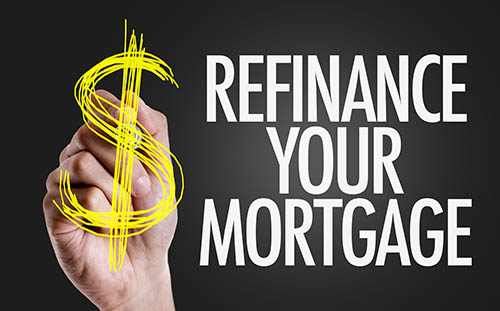 If you’re familiar with the real estate market, you’ve likely heard the term ‘refinancing’ and may be wondering what this can mean for your mortgage and your financial well-being. While refinancing can be a great benefit for those who are looking for a lower interest rate or a different mortgage type, here are the details on what it can offer and whether or not it will work for you.
If you’re familiar with the real estate market, you’ve likely heard the term ‘refinancing’ and may be wondering what this can mean for your mortgage and your financial well-being. While refinancing can be a great benefit for those who are looking for a lower interest rate or a different mortgage type, here are the details on what it can offer and whether or not it will work for you.
Acquiring A Lower Interest Rate
The most common reason people consider refinancing their home is to take advantage of a lowered interest rate. While it might seem like a minimal savings each month, a lower interest rate can add up to considerable savings over time and help you pay off your home loan more quickly. It’s just important to ensure that you’re aware of all the associated costs with refinancing before pursuing this option.
Limiting Your Loan Term
Refinancing also offers homeowners the opportunity to change the term of their loan, which can offer improved financial stability much sooner than expected. Many homeowners may avoid this option because it can bump up their monthly payment, but the difference in cost can be relatively insignificant while still offering financial freedom in less time.
Changing Your Mortgage Type
There are benefits and drawbacks of adjustable-rate and fixed-rate mortgages, and that’s why many people make the decision to refinance and opt out of their rate profile. While fixed-rate mortgages offer stability since you’ll know what you’re paying, an adjustable-rate will move with the market and can actually mean more savings at the end of the day. The option that will work best for you is dependent upon how comfortable you feel with the market.
Consolidating Your Debt
For homeowners who have a high debt load, refinancing can be a means of paying less in order to pay down debt at a more rapid rate. However, it’s important before choosing this option to determine a budget plan you can stick with, as refinancing to consolidate your debt does not necessarily mean you’ll be successful at paying it down. Ensure you weigh your options and potential savings carefully before making a decision.
Refinancing may seem like a good financial decision, but there are costs that go along with this mortgage option so it’s important to crunch the numbers to ensure it will work in your favor. If you’re currently considering refinancing, contact one of our mortgage professionals for more information.

 With interest rates on the rise following the 2016 election, it’s possible that you’re now considering your options for refinancing your current mortgage. It can sometimes be hard to know all of the ins and outs of making this choice, though, and it’s important to know what’s involved. If you’re trying to determine if refinancing will work for you, here are some of the basics on this option and what it can mean for your equity.
With interest rates on the rise following the 2016 election, it’s possible that you’re now considering your options for refinancing your current mortgage. It can sometimes be hard to know all of the ins and outs of making this choice, though, and it’s important to know what’s involved. If you’re trying to determine if refinancing will work for you, here are some of the basics on this option and what it can mean for your equity. When it comes to your mortgage, there are a lot of key terms that are important for every homebuyer to know, and this is no less true than when it comes to refinancing your most important investment. Instead of leaving what’s unknown up to chance, it’s important to be aware of exactly what you’re looking at so you can get the best mortgage product available. If you’re currently considering refinancing and don’t want to get snared by unknown terminology, here are some terms you’ll need to watch out for.
When it comes to your mortgage, there are a lot of key terms that are important for every homebuyer to know, and this is no less true than when it comes to refinancing your most important investment. Instead of leaving what’s unknown up to chance, it’s important to be aware of exactly what you’re looking at so you can get the best mortgage product available. If you’re currently considering refinancing and don’t want to get snared by unknown terminology, here are some terms you’ll need to watch out for. As a homeowner, you may have heard the term re-financing without being aware of exactly what it means, but there are a lot of pros and cons associated with what it can do for your financial situation. While getting a different new loan for your mortgage can be a good financial decision in certain situations, here are some things you should consider before you decide that this is the right choice for you.
As a homeowner, you may have heard the term re-financing without being aware of exactly what it means, but there are a lot of pros and cons associated with what it can do for your financial situation. While getting a different new loan for your mortgage can be a good financial decision in certain situations, here are some things you should consider before you decide that this is the right choice for you. Whether you’ve decided to renovate your home or you would like to consolidate your debt, refinancing your mortgage can be an option in times of money trouble; however, it’s important to know whether or not this is the right step for you. If you’ve been considering refinancing recently and are wondering how to come to a decision, here are some questions you should ask yourself before wading into the water.
Whether you’ve decided to renovate your home or you would like to consolidate your debt, refinancing your mortgage can be an option in times of money trouble; however, it’s important to know whether or not this is the right step for you. If you’ve been considering refinancing recently and are wondering how to come to a decision, here are some questions you should ask yourself before wading into the water.